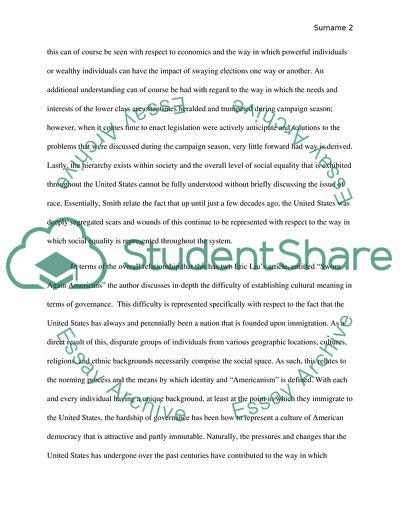Cite this document
(What it means to be an American: A Discussion of Social/Political Equality and the Democracy Essay Example | Topics and Well Written Essays - 1250 words, n.d.)
What it means to be an American: A Discussion of Social/Political Equality and the Democracy Essay Example | Topics and Well Written Essays - 1250 words. https://studentshare.org/social-science/1839832-what-does-it-mean-to-be-an-american-do-we-have-social-equality-do-we-have-political-equality
What it means to be an American: A Discussion of Social/Political Equality and the Democracy Essay Example | Topics and Well Written Essays - 1250 words. https://studentshare.org/social-science/1839832-what-does-it-mean-to-be-an-american-do-we-have-social-equality-do-we-have-political-equality
(What It Means to Be an American: A Discussion of Social/Political Equality and the Democracy Essay Example | Topics and Well Written Essays - 1250 Words)
What It Means to Be an American: A Discussion of Social/Political Equality and the Democracy Essay Example | Topics and Well Written Essays - 1250 Words. https://studentshare.org/social-science/1839832-what-does-it-mean-to-be-an-american-do-we-have-social-equality-do-we-have-political-equality.
What It Means to Be an American: A Discussion of Social/Political Equality and the Democracy Essay Example | Topics and Well Written Essays - 1250 Words. https://studentshare.org/social-science/1839832-what-does-it-mean-to-be-an-american-do-we-have-social-equality-do-we-have-political-equality.
“What It Means to Be an American: A Discussion of Social/Political Equality and the Democracy Essay Example | Topics and Well Written Essays - 1250 Words”. https://studentshare.org/social-science/1839832-what-does-it-mean-to-be-an-american-do-we-have-social-equality-do-we-have-political-equality.


